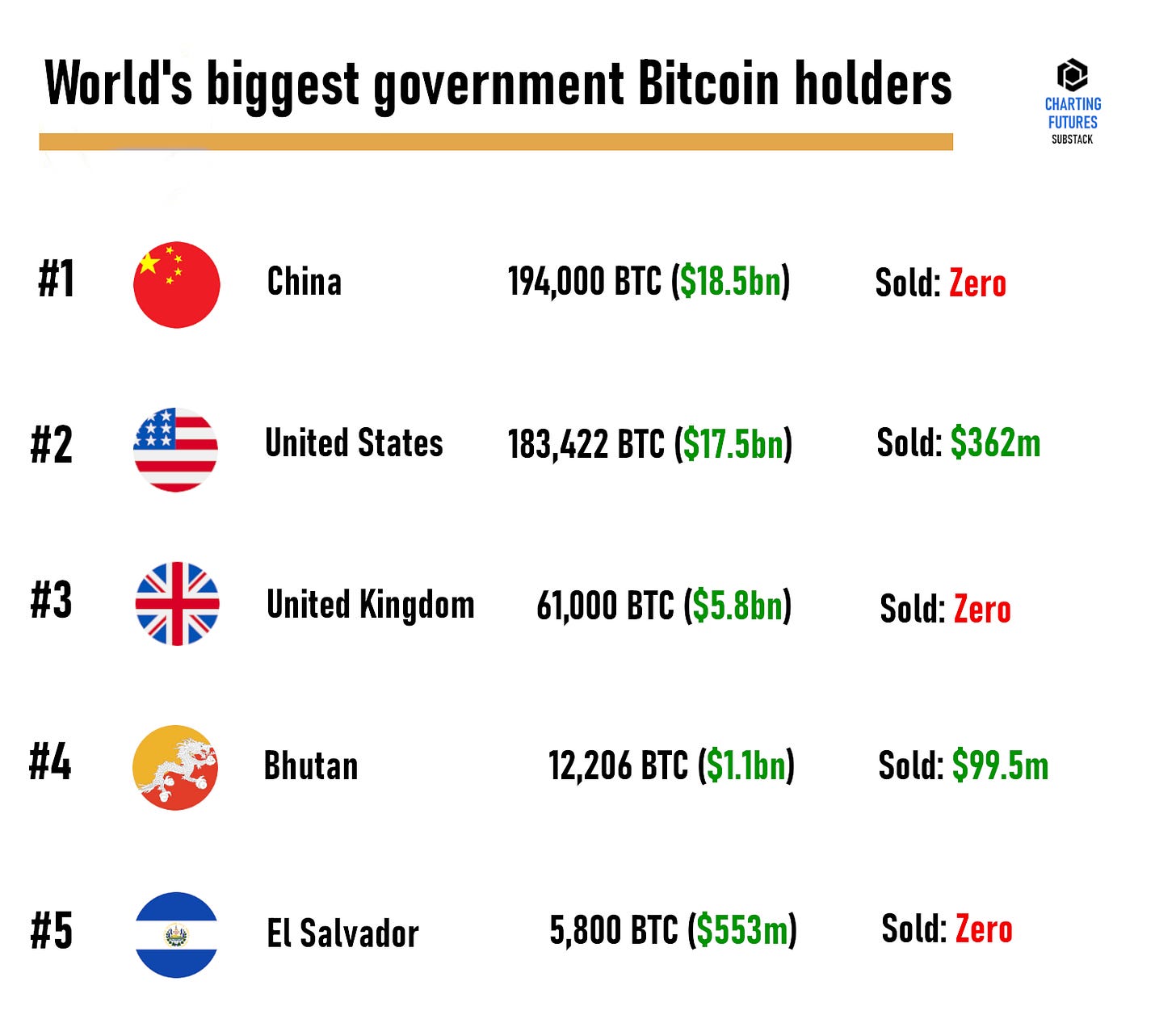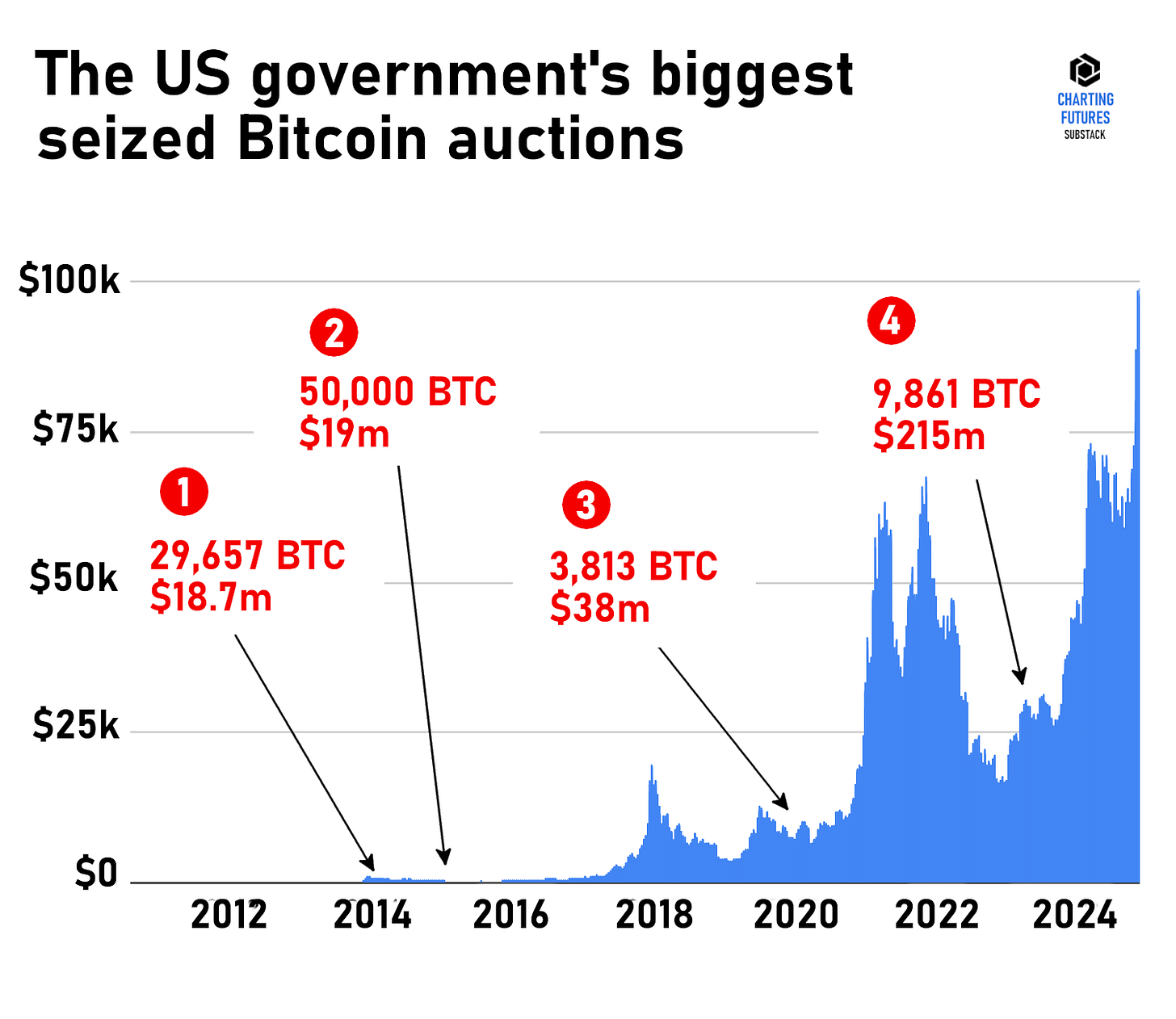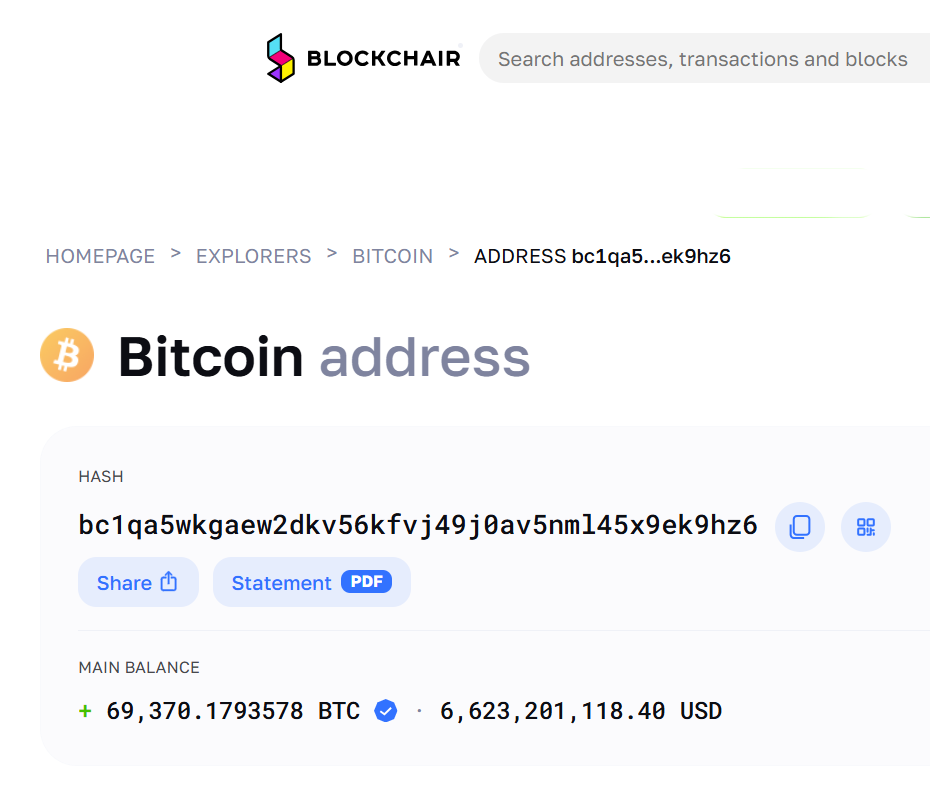To answer the question quickly: it is a lot more than you think.
If you believe the frothiest speculation on Bitcoin’s role in an upcoming Trump presidency, you’ll be foaming at the mouth at the idea of a National Strategic Bitcoin Reserve.
But while institutions have adopted Bitcoin exposure through price-tracking ETFs, backing the hard currency coins themselves remains too hot to handle for most politicians.
Still, it’s worth just looking at how much the US government already holds in Bitcoin.
And how life could change if it’s not forced to sell crypto as a criminal-linked forfeit.
Marshal law sells billions
When the US government wants to make bank from seized goods, they hold an auction.
But unlike Homer Simpson, not just anyone can rock up to Chief Wiggum’s police auction and pick up a bargain 1974 Pontiac GTO muscle car purloined from a famous cartoon criminal.
The price of an entry to buy Bitcoin on the cheap from Uncle Sam? A hefty $200,000 deposit.
Since 1984’s Comprehensive Crime Control Act, the US Marshals Service has been selling off assets nabbed from drug lords and dodgy dealers.
These range from collectibles to yachts, gold and silver, fine jewellery, famous paintings, Rolex watches and precious gems.
Anything that’s deemed to help move illicitly-obtained value across borders.
And it works. Research suggests crime has fallen 17% in places where the federal law let police to sell more of their seized assets than state law allowed.
The UK equivalent is the 2002 Proceeds of Crime Act (POCA). If you’ve ever seen a matt-wrapped Porsche Macan GT3 or a bright yellow Lambo disappear from outside a house near you that stinks of weed, it’s probably due to the good people enforcing POCA.
Shipping Forecast
There’s a bonkers amount of stuff snatched daily from felons and villains.
Let’s pick another government department, the US Customs and Border Protection Agency. Each month they publish a list of what they’ve got their mitts on from ports across San Francisco, Chicago and New York.
December 2024’s list includes two brown bags stuffed with $100,000 cash, a truckload of counterfeit Gucci sandals, 1,150 Apple iPhones, a shipping crate of Queen Size mattresses (value: $199,640), Cartier necklaces, earrings and diamond-studded watches, a Bitmain S21 Pro Bitcoin mining machine worth $213,286, 13 boats, a $40,000 aircraft gun turret and on and on and on.
This forfeiture list runs to 1,220+ pages. Every month.
Auctions rotate this stuff around the country daily, and not just through the US Marshals Service. There are myriad smaller bodies set up to flog the vast tranches of stuff the feds can’t hang on to: from boats to barges, private jets to computers and tour buses to cryptocurrencies. The next five crypto auctions, for example, include 1.8 billion Shiba Inu, 614 Ethereum Classic, and over 1,000 Cardano tokens.
And a couple of billion memecoins could be worth $50,000 now, $500,000 in a month, or $50 next year. Better to realise some value now than watch it waste away.
So you can see why the US Government is not a Bitcoin HODLer. While Wyoming is by far the most cryptocurrency-friendly, states cannot, under law, hold Bitcoin in treasury as an asset.
Just as police can’t hang on to creaking warehouses piled to the ceiling with seized mattresses and iPhones.
While it may amuse the army of snarky “have fun staying poor” crypto bros to suggest authorities have lost out on $18bn of potential gains by selling Bitcoin, instead of holding it, this is not grounded in law.
Pump the golden goose
It could all change if the US develops a National Strategic Bitcoin Reserve.
Legally it seems pretty straightforward. The 183,422 Bitcoin now held as a crime-derived asset would revert to the central Treasury Department. Then, the nation could buy Bitcoin and secure it with a legitimate custodian. More likely than not, this would be the Bank of New York (BNY) Mellon.
This is the largest custodian bank in the world, managing $52.1 trillion of assets — making it four times larger than BlackRock. It rolled out crypto custody in 2022.
Other strategic reserves, like the UK’s 310 tonnes of gold, squirrelled away in underground Bank of England vaults, the bombproof haul inside Fort Knox, or America’s glut of 727 million barrels of oil, held at four sites in the Gulf of Mexico, also work this way.
But back to the money spinning.
How it started
The first US government crypto auction was for 29,562 BTC in 2014. At the time, Bitcoin was trading for only $600 a coin. A noted venture capitalist called Tim Draper scooped up the batch for $12 over market price. His net worth is circa $2bn today, making him approximately the 1,600th richest person in the world.
This currency was part of a stash seized in one of the biggest internet crimes of all time: Silk Road.
It’s a wild story in and of itself. In October 2013, it’s alleged the FBI “obtained” 144,000 Bitcoin, then another 70,000 Bitcoin, by recruiting an independent specialist, known as Individual X, who had hacked the darknet website’s payment system.
Dread Piracy
Down the line, people will start to forget that Bitcoin was not always the preserve of BlackRock and boring TradFi ETF markets. It was the currency of choice for the most dangerous kind of criminals: those adherent to a radical philosophy.
And I want to take a little detour to tell you about the owner of Silk Road. It’s relevant, because it sets the stage for the next decade of global black markets.
In 2014 a mild-mannered 31-year-old Texas-born nerd was jailed for life for his part as admin of this online marketplace. It offered guns, drugs, stolen credit cards, fake IDs and pretty much anything not deemed legally obtained.
As it grew from whispered legend to the worst-kept secret on the internet, Silk Road evolved into the template for every illicit darkweb bazaar that followed.
The desired means of exchange for buyers and sellers was Bitcoin. The cryptocurrency was little known at the time, aside from a few choice individuals who were competent at shifting hot goods cross border through the US Postal Service. But as these drug dealers found, hoarding was a much better use of crypto than as currency itself.
One Silk Road buyer by the name of ‘Joey Terrifying’ told Forbes in early 2014 he used the site to buy a gram of ecstasy, with the intention of flipping it for profit. Three weeks later, Bitcoin had soared so high that it dwarfed the value of the drug sales. He lamented: "I would have more money now if I had just done nothing at all.”
Before his introduction to crypto, Ross Ulbricht was a former Eagle Scout, bookseller and video game programmer who earned a master’s degree in engineering. A chance encounter with the libertarian economic rabbit hole — and Satoshi Nakamoto’s early posts on the BitcoinTalk forum — switched his mind to money, and so the legend of this criminal empire began.
His online moniker — Dread Pirate Roberts — was laced with irony, as these things always are.
It’s the pseudonym taken by several characters in the wonderful William Goldman novel and subsequent 1987 film The Princess Bride. Like The Grey Fox — the head of of the Thieves Guild in Bethesda’s Oblivion — assorted pirates assume the name the Dread Pirate Roberts, use its reputation to intimidate their way to riches, then quietly retire and pass on the fabled name to the next would-be swashbuckler king.
“Money is powerful,” Ross Ulbricht once wrote, “and it’s going to take power to effect the changes I want to see.”
There will be no gentlemanly Caribbean retreat for this Dread Pirate, though. The FBI tracked him down in the science fiction section of a San Francisco library and completed his arrest. He will rot in a frightening Utah prison for the rest of his days.
Intriguingly, the Dread Pirate was also hit with a whopping $183m fine tied to Silk Road’s booming sales. But in 2022, this was cancelled in one fell swoop.
Ulbricht gave up his legal right to 69,370 Bitcoin held in this wallet, presumably by handing over the private keys, and the US Department of Justice assumed its control. Because Bitcoin is an open ledger, we can see that the Bitcoin has not been moved or sold — yet — and at ~$95,000 a coin, is currently worth $6.6 billion.
No Income Tax No VAT
Today, Bitcoin is not particularly useful for criminal activity.
Thieves and drug dealers now tend to request payment in privacy-focused crypto coins like Monero or Zcash for online black market sales, where they still exist.
And 10 years in the spotlight means the public Bitcoin ledger of who owns what, and where it moves, is scrutinised thousands of times a day by blockchain intelligence shops and three-letter spying and policing units like Russia’s FSB, the NSA and the UK’s National Crime Agency.
Address tracking, matching and tracing is substantially more sophisticated than it was.
Case in point: in the last 24 hours analysts tracking US government Bitcoin holdings at Arkham Intelligence note that wallets belonging to the US Department of Justice have moved 10,000 BTC to Coinbase Prime, signalling an intent to sell a stash worth $1.92bn.
So it’s not great for crime any more. But as a store of value? While volatile, Bitcoin has more than crossed the threshold. I think that’s unassailably true.
What comes next
A National Strategic Bitcoin Reserve is not the immediate economic priority of the Trump presidency. There are tariff threats to make. And there’s the small matter of that pesky cabal of competing nations in BRICS, making troubling noises about shifting oil and currency market hegemony away from the Almighty US dollar.
Other less controversial crypto-related legislation will also reach Congress first, such as legalising US dollar stablecoins for payment, and repealing the little-reported SAB121 accounting rule to allow banks to custody crypto for their customers.
But we shouldn’t be surprised if we find in the next five years governments from the United Kingdom to China enacting novel regulations to allow them to hold Bitcoin for the long term.
It’s an easy advantage. Few crypto market specialists would gladly give it up.









It is interesting that crypto in general and bitcoin in particular seem to be tiptoeing towards “respectability”. It would be useful for governments to be able to levy capital gains tax on transactions ( or even stamp duty!). Hard to imagine that happening though. A strategic crypto reserve is a bit of a mind blowing concept…